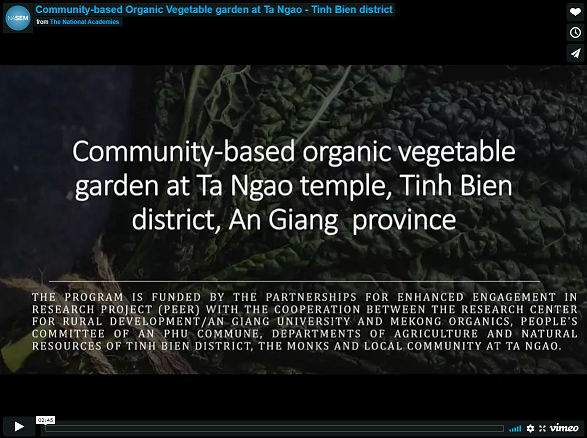|
Cycle 3 (2014 Deadline) Water governance of minority communities in the Mekong Delta PI: Nguyen Van Kien ( nvkien@agu.edu.vn) and co-PI Nguyen Trung Thanh, Research Centre for Rural Development, An Giang University U.S. Partners: Carol Xiaohui Song and Venkatesh Merwade, Purdue University Project Dates: October 2014 to August 2019 Project brochure on rainwater harvesting Project brochure on automatic irrigation system Project brochure on organic vegetable gardens | | An An Giang television program depicting project work at Khmer temples. |
Project OverviewWater is critical to all life. Unfortunately, there are still hundreds of millions of people without access to proper water and sanitation facilities. Unequal or unethical distribution of water and access to resources is a critical issue worldwide. Underrepresented groups and minority communities are often the most vulnerable to the effects of climate change, and it is critically important to engage minority populations in the management of water resources. The goal of this research project was to work with underrepresented communities in Southern Vietnam to improve water resource management by studying water governance and water access within local villages. Specifically, this project investigated and documented water management knowledge of the Khmer communities in Southern Vietnam, where there is a big gap between science and knowledge in water governance. The investigators involved in this project had already proven the importance of village-level analyses through previous work with the Vietnam Delta and on resilience of populations to flooding. This project built on their previous work and created new knowledge on underrepresented groups living in the Mekong Delta. The project also strengthened the scientific merit of the hydrologic modeling work being conducted by the U.S. partners at Purdue University. Understanding management decisions and strategies of the Khmer people, as well as other underrepresented groups, can better inform the assumptions made in hydrologic modeling.  |  | | Dr. Nguyen Van Kien and his team are training Khmer women, men, and monks to pilot a community-based organic garden at Ta Ngao Temple, Tinh Bien District, An Giang Province, as part of their work on PEER project 3-190. The aim of this sub-component is linking organic agriculture/nutrition and public health for adults and children in the Khmer community in the context of water governance. This portion of the project is an extension of the successful pilot community-based organic vegetable garden at the Khmer temple in O Lam Commune of Tri Ton District, funded by the Australian Government (Aus4Skills) for Australian Scholarship Award (AAV) Alumni.” Photos © Mr. Nguyen Hoang Khang, a member of Mekong Organics. |
Final Summary of Project Activities This project was originally expected to last three years, but thanks to careful planning and leveraging of other support he obtained, the PI Dr. Kien was able to extend the project for almost five full years. He and his colleagues were able to expand on their original goals to accomplish more than anticipated, including with some additional support provided by a PEER discretionary supplement. Following is a list of key project outcomes by this productive team: - Undertook a stakeholder workshop, 12 focus group discussions, 125 in-depth key informant interviews, and 200 structured interviews (household surveys) in Tri Ton and Tinh Bien Districts of An Giang Province and Vinh Chau Town of Soc Trang Province.
- Made four research presentations, including at the National Groundwater Conference in Australia in 2017, a Vietnam stakeholder workshop in Soc Trang Province (2015), an international workshop at An Giang University (2018), and a training workshop in Tinh Bien District, An Giang Province (2019).
- Supported five students to complete their Master’s degree programs.
- Completed two international visits by the PI and co-PI to the United States in 2015 and 2017, one trip to Australia by two research assistants and PI, and one trip for the PI from Australia back to An Giang University to organize the international workshop in September 2019.
- Set up and piloted a community-based rainwater harvesting system and an organic vegetable garden at Ta Ngao Temple in Tinh Bien District, An Giang Province.
- Set up a pilot automatic irrigation system for a Khmer farmer (this project was adopted by local NGO GREEN ID for replication at other project sites in Tinh Bien District, An Giang Province, in 2018).
- Developed three policy briefs and two video clips to advertise the pilot activities to the community.
- Developed strong ties between researchers and government officials, international collaborators, and experts in water governance and community development.
- Built a linkage with the Vietnam Field School Program from Australian National University to visit the PEER project site since 2015.
- Gathered and provided baseline data for other research on the Khmer community in the Mekong Delta.
The PI Dr. Kien reports receiving eight other grants during the period of his PEER award to help expand and now continue his activities even now that PEER support has ended. For example, in November 2018 he received AUD$15,000 for 2018-2019 from the Aus4Skills Small Grants Fund to help develop partnerships between Australia and Vietnam for the organic agriculture movement. He and two colleagues hosted the first Mekong Delta Forum on the movement and undertook a study tour in several Australian states to visit organic farmers, educators, NGOs, and industry. They also piloted community-based organic vegetable gardens for Khmer people in temples in southern Vietnam (An Giang Province) and promoted the Mekong Organics Platform. In 2019, he received his most recent follow-on grant, which was funded for 2019-20 by SEARCA (Southeast Asian Centre for Graduate Study and Research in Agriculture) in the amount of USD$15,000. As part of this nationwide project, which is entitled “Social perceptions of the organics industry in Vietnam,” Dr. Kien leads a multidisciplinary research team (encompassing social science, food science, agronomy, economics, nutrition, public health, and agricultural policies). As of October 2019, the team was reviewing the relevant literature and designing questionnaires for use in their study.
Back to PEER Science Cycle 3 Grants
|
|
|
|





